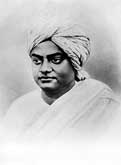| |
"That wonderful Gita, Margot! Not one note of weakness or discouragement in it!”
Said to Nivedita, March 23, 1899
“A Kshatriya, O Arjuna, does well to fight in such a cause as this. Dying he gains heaven and victorious he enjoys this world."
On the Golconda in July 1899, he recited from the Guru Gita: “'To that Guru who is Brahman, to that Guru who is Vishnu, to that Guru who is Siva, to that Guru who is Para Brahman, I bow down to that Guru. From the Guru is the beginning yet is he without beginning: to that Guru who is greatest among the gods, to that Guru who is Para Brahman, I bow down to that Guru.’"
Time Period: Wandering years.
Swamiji found inspiration from a Hindi couplet etched on the walls of a sadhu's cottage in Vrindavan:
O desire, you are the lowliest of the lowly
like a woman of the caste of sweepers or tanners.
Had you not come inside me, I would have remained a Brahman.
(Source: Reminiscences of Swami Turiyananda.)
"In wealth is the fear of poverty, in knowledge the fear of ignorance, in beauty the fear of age, in fame the fear of backbiters, in success the fear of jealousy, even in body is the fear of death. Everything in this earth is fraught with fear. He alone is fearless who has given up everything"
(source: Vairagya-Shatakam , 31)
He quoted from the Katha Upanishad, 'When desire is all gone, and all the cords of the heart are broken, then man attains to immortality.'
Swami Vivekananda frequently quoted Hindu and other religions' scritpures, as well as various sages and saints of earlier periods. Sometimes, he would freely translate these: striving, it seems, for a more exact rendering -based on meaning - which perhaps he better understood than the mere translater who works with dictionary, but perhaps without the direct realization of what the sage or rishi spoke of.
The following are some of the verses he quoted in lectures, letters and elsewhere:
- 'The Lord dwells in the hearts of all beings, O Arjuna, by His illusive power causing all beings to revolve as though mounted on a potter's wheel.'
[Bhagavad-Gitâ XVIII.61]
- Of the Sannyasin, he said,: "'He stands on the heads of the Vedas!" say the Vedas,'
(Letter to Mary Hale - February 1, 1895)
- "Go thou thy ways, Sannyasin! Some will say, 'Who is this mad man?' Others, 'Who is this Chandâla?' Others will know thee to be a sage. Be glad at the prattle of the worldlings." - Bhartrihari.
(Letter to Mary Hale - February 1, 1895)
- "The elephant passing through the market-place is always beset by curs, but he cares not. He goes straight on his own way. So it is always, when a great soul appears there will be numbers to bark after him." (Tulasidasa)
(Letter to Mary Hale - February 1, 1895)
- "None can go a day out of my path. All have to come to me. Whosoever wants to worship in whatsoever form, I give him faith in that form, and through that I meet him. ..."(Gita, IV. 12.)
- "To work you have the right, but not to the fruits thereof." (Ibid. II. 47.)
- "Leaves and water and one flower — whosoever lays anything on my altar, I receive it with equal delights."(Ibid IX. 26.)
- "The Lord resides within the heart of the being, making them turn upon His wheel. Do thou with all thy soul and heart take refuge in Him. ..."(Ibid XVIII. 61-62.)
- "Whenever virtue subsides and irreligion prevails, I come down. Again and again I come. Therefore, whenever thou seest a great soul struggling to uplift mankind, know that I am come, and worship. ..."(Ibid. IV. 8; X. 41.)
- "He who finds in the midst of intense activity the greatest rest, and in the midst of the greatest rest intense activity, he has become a Yogi." (GITA. IV. 18.)
- "Behold, I am the Lord of the Universe. I have no duty. Every duty is bondage. But I work for work's sake. If I ceased to work for a minute, there would be chaos."(GITA. III. 22-23.)
- Making happiness and misery the same, making
success and failure the same, fight thou on. (Gita)
- Not he that lusts after objects of desire,
but he alone obtains peace in whom desires lose hemselves like
river-water
flowing into the ocean but leaving it unaffected and unmodified in spite
of constant accession. (Gita-11.70)
- Ever steeped in the darkness of ignorance, yet considering themselves wise and learned, the fools go round and round, staggering to and fro like the blind led by the blind (Katha Upanishad 1, ii.5)
- We have taken up the Cross, Thou hast laid it upon us and grant us strength that we bear it unto death. Amen! (Imitation of Christ)
- It must be the memories, unwittingly recalled, of affinities firmly established in previous incarnations, through depths of heart. ( Kalidasa's Shakantalam Act V)
- None is good, save One, that is, God (Jesus)
- Wake up, stop not until the goal is reached.(Vedas)
- In wealth is the fear of poverty, in knowledge the fear of ignorance, in beauty the fear of age, in fame the fear of backbiters, in success the fear of jealousy, even in body is the fear of death. Everything in this earth is fraught with fear. He alone is fearless who has given up everything. (Vairagya Shatakam 31)
- Sankhya, "The whole of nature is for the soul, not the soul for nature."
|
|
